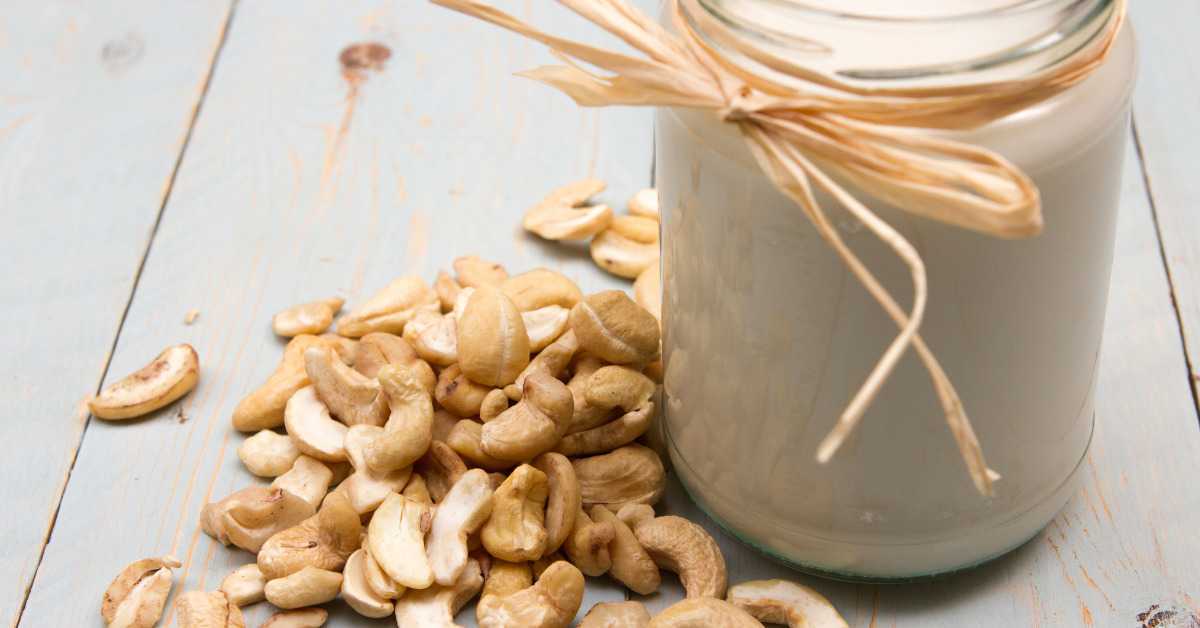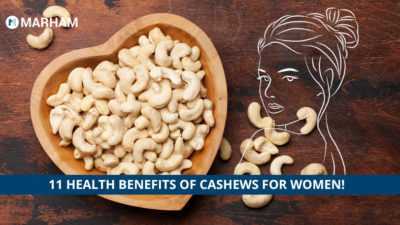Cashews are a nutrient-rich nut that offers many benefits for female health. They are a good source of copper, magnesium, and calcium. Cashew nuts or Kaju are also enriched with zinc, which is essential for female reproductive health.
In this article, we will discuss the 10 best cashew benefits for female health and how many cashews you should eat daily to reap these benefits!
About Cashews:

Cashews are native to Brazil, but they are now grown in many different parts of the world. They have several health benefits for women. They can help to reduce the risk of heart disease, stroke, and cancer.
Cashews can also help to improve bone health and reduce the risk of osteoporosis. Moreover, they can also help to improve mental health and cognitive function.
Cashew Nutrition and Calories:
Cashews are a good source of vitamins, minerals, and antioxidants. They are low-fat food and are cholesterol-free. One ounce (28 grams) of cashews contains about 157 calories.
Some Vitamins and minerals found in cashews are:
- Iron
- Vitamin B complex
- Calcium
- Vitamin C
- Magnesium
- Vitamin E
- Vitamin A (Beta-carotene)
- Vitamin K1
- Copper
- Zinc
Also, check out the 10 Amazing Dry Fruits for Skin
10 Cashew Benefits for Female Health
Cashews are a delicious and nutritious snack, but did you know that they offer specific benefits for female health Here are ten cashew benefits that every woman should know about:
1. Improve Heart Health:
According to research, women have a higher risk of dying from heart disease than males. So, they should be extra careful about taking a heart-healthy diet.
Cashews can improve your cardiovascular health. The magnesium in cashews helps to relax blood vessels and reduce the risk of hypertension, or high blood pressure. This, in turn, can reduce your risk of heart disease.
2. Improves fetal growth:
Cashews are abundantly packed with all the essential vitamins and minerals that are associated with the optimum growth of the fetus during pregnancy.
Cashews are enriched with omega-3 fatty acids. These fatty acids are found to be very important for the growth of the fetus during pregnancy. It is known to be the building block for the development of the fetal brain and retina
These fatty acids are also considered an essential element in determining the gestation time and preventing pre-term labor. Evidence is also present relating perinatal depression to the concentration of omega-3 in the body.
3. Enhance Mood:
Cashews are a good source of tryptophan, an amino acid that the body uses to produce serotonin. Serotonin is a neurotransmitter that plays a role in mood regulation.
Eating cashews can help to enhance your mood and reduce anxiety and depression. Moreover, they can be beneficial in relieving mood swings caused due to hormonal imbalances or premenstrual syndrome in females.
Cashews are also found to be essential for avoiding depression associated with the lack of certain vitamins and minerals including vitamin B and folate.
4. Support Bone Health:
Women are the main victims of bone diseases like osteoporosis and arthritis. Cashews are a good source of calcium and copper, which are essential for bone health.
While calcium is necessary for healthy bone health, copper helps to maintain bone density and prevent osteoporosis. In addition, the magnesium in cashews can help to reduce the risk of fractures.
This is an important effect in preventing bone weakness and related disorders in women during childbearing and post-menopausal age.
5. Regulate Blood Sugar in pregnancy:
According to data from 2019, the rate of prediabetes and diabetes has risen steadily in Pakistan. It means you might be at risk of developing diabetes especially if you are overweight or obese.
The nutrients in cashews can help to regulate blood sugar levels. The healthy fats and proteins in cashews slow down the absorption of sugar into the bloodstream, preventing spikes in blood sugar levels.
Cashews have a low glycemic index which makes them a healthy choice for pregnancy as the chances of worsening gestational diabetes are lower.
consult a gynecologist for better advice.
6. Reduce Inflammation:
Cashews are a good source of zinc, which is an important mineral for reducing inflammation. Zinc helps to reduce the production of inflammatory cytokines and can help to treat conditions like arthritis.
Increased inflammation is found to be related to abnormal brain development and increased chances of mental illnesses in children during pregnancy.
Also, read about the benefits of eating dragon fruit during pregnancy.
7. Boost Immune Function:
The copper and zinc in cashews help to boost immune function. These minerals are essential for the production of white blood cells, which help to fight infection. Zinc also imparts the antioxidant effect to help boost the working of the immune system.
During pregnancy, many parts of the immune system are suppressed while the functions of others are enhanced. The immune system works to protect both the mother and the child due to which cashews are needed to enhance its efficiency.
10. Support Weight Loss:
Obesity in women is found to be associated with hormonal imbalance resulting in infertility or reproductive disorders like PCOS (polycystic ovarian syndrome).
Cashews are a good source of protein and healthy fats, both of which are important for weight loss. The proteins in cashews help to boost metabolism and the healthy fats help to promote satiety.
Including cashews in your diet can help you to reach your weight loss goals as the fiber content in them imparts a feeling of fullness to the body thus preventing weight gain.
11. Cashew Benefits for Hair:
Cashews can improve your hair health. The zinc in cashews helps to promote hair growth and the copper helps to prevent hair loss. In addition, the selenium in cashews can help to reduce dandruff.
Consult a dermatologist for professional advice.
These are just a few of the many benefits that cashews offer for female health. So next time you’re looking for a nutritious snack, reach for some cashews! Your body will thank you.
Also, see the Disadvantages of Cashew Nuts You Should Know!

How many cashews should a woman eat per day?
It depends on a woman’s individual calorie needs. However, a good rule of thumb is to aim for around 20-30 grams of nuts per day. This amount will provide plenty of health benefits while still allowing room for other healthy foods in your diet.
You can enjoy them as a snack on their own, add them to salads or stir-fries, or use them in place of other nuts in recipes. No matter how you eat them, they’ll be a delicious and nutritious addition to your diet!
The Bottom Line
There are a variety of cashew benefits for female health, from improving bone health to aiding in weight loss, cashews can have a positive impact on many areas of women’s health.
So if you’re looking for a nutritious snack that does more than just taste good, reach for some cashews the next time you need a pick-me-up.
If you want to lose weight or have any other diet-related questions don’t be afraid to reach out to a Nutritionist. Click here to book an online appointment with the Best Nutritionists in Pakistan via the Marham App today!
Can’t Find the App?
| Android | IOS |
|---|---|
 |
 |
FAQs
1. Is it good to eat cashews every day?
Cashews are a good source of several essential nutrients, including copper, magnesium, and phosphorus. They’re also a good source of monounsaturated fats, which can help to lower cholesterol levels. Eating a handful of cashews each day may therefore be beneficial for heart health. Additionally, the protein and fiber content in cashews may help
2. Do cashews increase fertility in women?
Cashews or Kaju are known to increase fertility in both men and women. This may be due to the presence of zinc in cashew nuts which boosts the production of reproductive hormones.
3. How many cashews can a pregnant woman eat?
Women can safely eat cashews not exceeding 1 oz (28 grams) daily during pregnancy. Eating cashews in moderation is associated with many health benefits both for the mother and the fetus.

